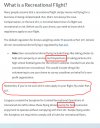But why should there be two separate classes of users?The fact that the F.A.A. requires so little for an operator to fly ”recreationally“ is a gift.
[...]
A professional license should imbue a level of knowledge and commitment above that of the recreational user.
I can fly over my house purely with the intent of recreational leisure, but later studying the video I notice that there are leaves collecting in the gutters of my house. That's okay because the original "intent" was recreational.
However, if on the exact same daily recreational flight over my house, I purposely intend to check the gutters during the flight, that's suddenly Part 107, for which I need to pay $$$ to pass an exam to demonstrate that I can decode METAR weather reports and all sorts of other totally inapplicable stuff which otherwise is not required for a recreational flight.
I know the FAA only did this because Congress told them to, and it's how the rules are currently interpreted. But why should the same flight be allowed to proceed with less applicable regulations if it's for fun versus for any other benefit?
The FAA makes this gift of requiring so little of recreational operators, yet requires a greater level of knowledge and commitment based solely on "intent"?
I fly my drones for my own enjoyment. A big part of that enjoyment is in making videos. It's not a business. I gain no benefit from this, other than the enjoyment of my hobby.You need your part 107 because your intent is to share your photos with anyone and everyone and they may use them to profit. Your intent may not be for you to make money, but your intent of sharing your photos when you have no control of how they are used compromises your "intent" IMO.
None of my videos are monetized by me. Yet I gain enjoyment from the fact that other people sometimes post encouraging comments on my Youtube videos, saying that they have enjoyed watching the video. Does that mean I require a full Part 107 certification because others have somehow "benefited" from watching my videos?
Another of my "recreational" hobbies is reading and sometimes contributing posts on this forum. To back up my opinions, I sometimes intentionally post videos with the "intent" and express purpose of demonstrating how a particular feature works on my drones. I recently posted a series of videos demonstrating how the infrared height sensors work on the VPS system on my Mavic Mini.
I'm not a licensed flight instructor. It's not my "intent" to instruct people how to fly their aircraft. Posting in this forum is merely another of my recreational hobbies. I "intentionally" flew my drone at low height in my own driveway to create videos demonstrating what the VPS height sensors actually can and cannot do. I did that as proof of what I posted in this recent thread:
mavicpilots.com/threads/yes-landing-protection-can-be-disabled-but.134162/
I could have done those exact same flights under different conditions:
- Just fooling around for my own amusement, no video, no post,
- Conduct an experiment solely for my own education, no video,
- Experimenting solely to support my written arguments in that thread,
- Experimenting and posting video evidence to support my arguments, or
- Experimenting, videoing, posting with the "intent" to educate others.
The FAA requires so little of recreational operators, yet if there's any chance of anyone benefiting from the exact same flight you better be carrying proof of your ability to decipher METAR and NOTAM codes etc. It makes no sense that recreational operators can be trusted to fly safely, yet anyone "intending" any benefit other than amusement to themselves must be held to a higher standard.














